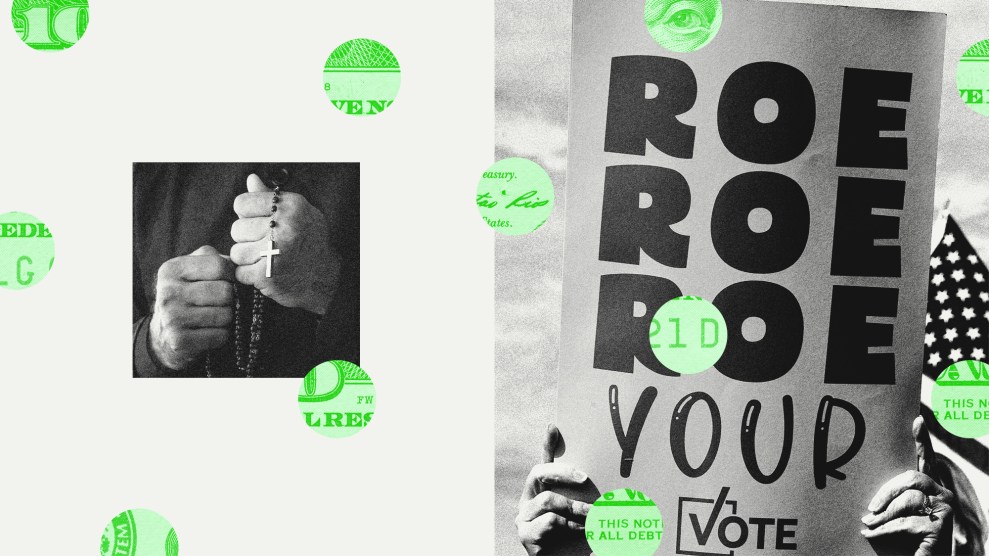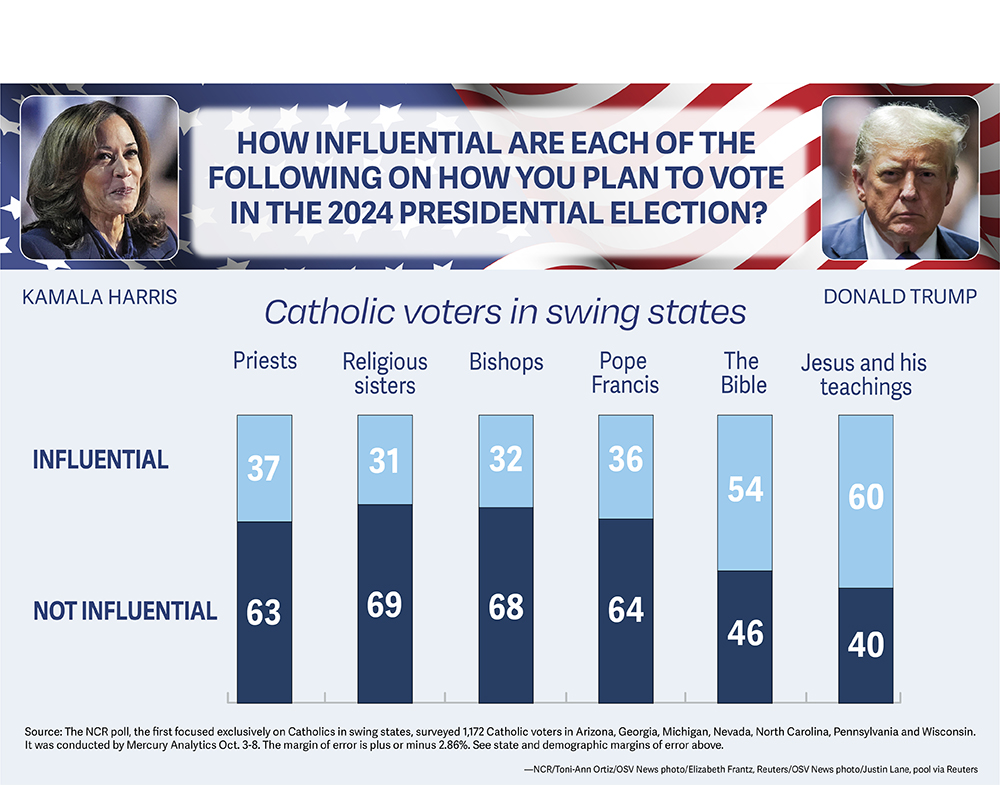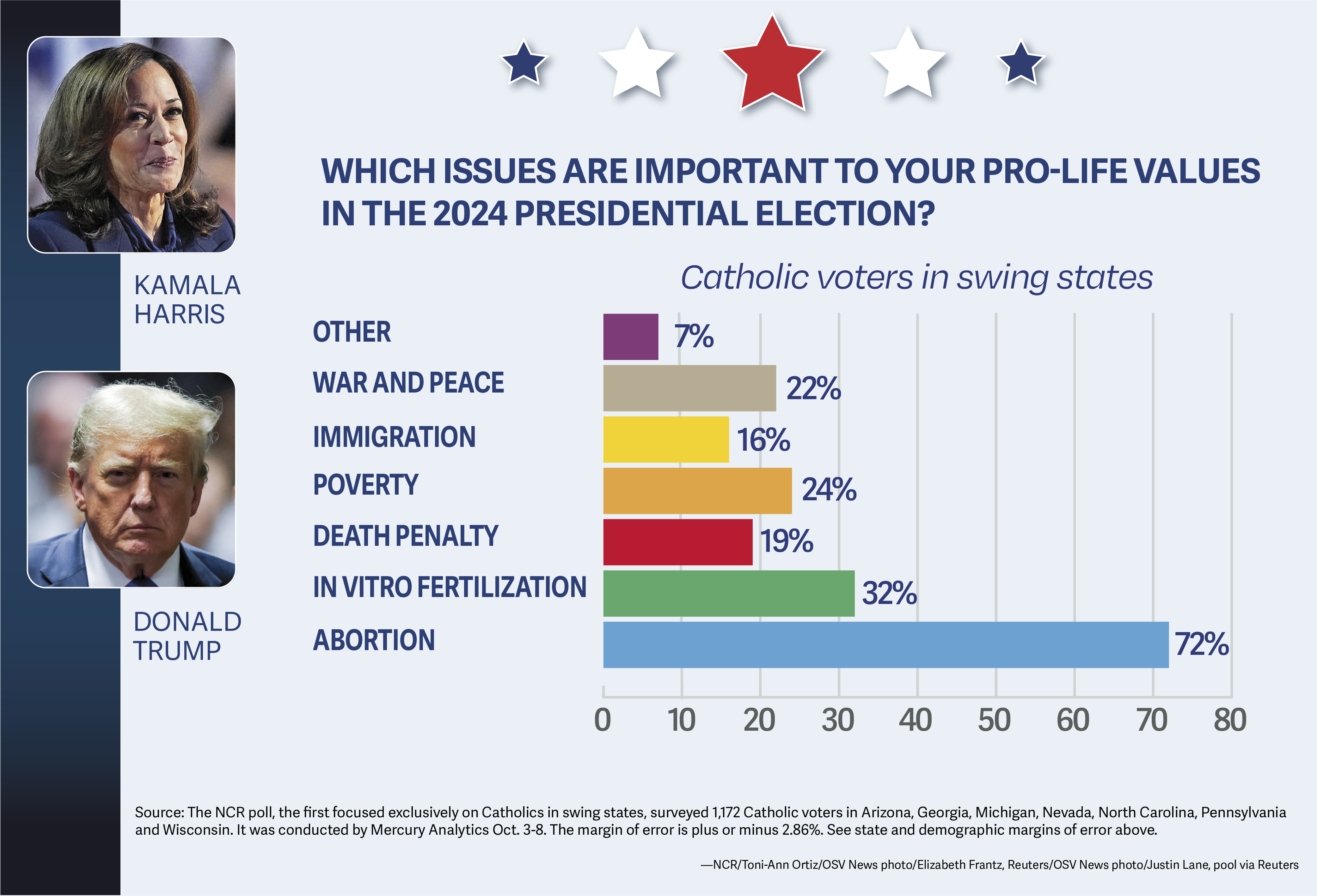
Mother Jones; Getty; Megan Varner/Getty
This story was produced in partnership with the National Catholic Reporter.
Since Roe v. Wade was overturned in 2022, every state-level campaign to limit abortion has failed. But that hasn’t stopped Catholic organizations from stepping into the fight again this election year.
Catholic organizations are bankrolling campaigns against abortion-rights measures, spending more than $1.9 million so far in five of the 10 states where such measures are on the ballot, according to a joint investigation by National Catholic Reporter and Mother Jones.
In Florida alone, dioceses and bishops have spent more than $1.1 million, and church entities in South Dakota have recently ramped up spending as the election nears. In other states, the church’s hierarchy may be sitting out financially, but wealthy individuals with well-established associations with the Catholic Church, or church-affiliated groups—like local parishes and Knights of Columbus chapters—have stepped into the fray.
The fight in Florida over Amendment 4—a ballot initiative to add the right to an abortion in the state constitution—has become a political lightning rod, so it may not be surprising that the high-profile battle has attracted heavyweight donors from across the country. Florida requires 60 percent voter approval to amend the state constitution.
Abortion-rights groups have raised at least $60.7 million, swamping the $9 million raised by anti-abortion groups—both sides flooding the airwaves with ads. The majority of the money pouring in on the abortion-rights side is from major national groups like the American Civil Liberties Union and Planned Parenthood. Catholics for Choice has contributed just $10,378 to the fight in Florida. (Searches in other states turned up no other donations from Catholics for Choice.)
With the appearance of a showdown between the powers on each side of the national debate, it may be fitting that the Miami Archdiocese has given the most money of any church organization in the country this year—three donations totaling $384,000 to a political action committee called Florida Voters Against Extremism.
The Florida Conference of Catholic Bishops has donated another $271,000, and the Catholic dioceses of Venice, Palm Beach, and St. Petersburg gave $100,000 each. Dioceses in Orlando, St. Augustine, and Pensacola also donated.
Various Florida Catholic dioceses and the state’s bishops’ conference have stepped in, financially, during previous ballot initiative fights, but never on this scale— prior to 2024, they had given just $198,000.
The church in Florida has made these donations, a representative from the bishops’ conference said, because “it would be unconscionable not to defend against this threat to the sanctity of unborn life and the dignity of pregnant women.”
The money comes from diocesan and individual contributions to the conference’s general operating funds, said Michele Taylor, associate director for communications. “Dioceses and the conference observe Florida election and campaign finance laws and so there have been no special collections for the defeat of Amendment 4,” she said.
Diocesan donations in other states were substantially smaller, but so is the overall size of the ballot initiative fights. In South Dakota, for instance, the Sioux Falls Diocese has donated $340,000 to two separate anti-abortion PACs fighting to block a ballot initiative to create a similar protection for abortion rights in the state constitution.
The one abortion-rights group raising money to support the ballot initiative’s passage had only raised $298,000 in September and October. The Sioux Falls Diocese’s donation included an in-kind donation of $40,000 for polling work. All of the diocese’s donations have been made since September 25.
Similarly, in Colorado, despite a heavily funded abortion-rights PAC filling the airwaves with ads in support of Amendment 79, another effort to install a right to abortion in the state constitution, the Catholic Church had seemed to be uninterested—at least in terms of financial donations—in the fight until very recently.
But on September 11, the Denver Archdiocese sent a $50,000 check to the Pro-Life Colorado Fund, and it sent a second much larger check for $175,000 to the same group on October 22.
In Missouri, by contrast, the St. Louis Archdiocese, four other dioceses around the state, and the state bishops’ conference all donated $5,000, but earlier in the year and only to the effort to block an abortion ballot initiative from ever getting on the ballot. Since the initiative was approved for the ballot, the dioceses haven’t donated again.
Some Missouri pro-life groups had hoped the fight against the constitutional amendment for abortion rights would attract more national money, said Jamie Morris, executive director of the Missouri Catholic Conference, the church’s public policy agency in the state. He believes the focus on the presidential race, and ones in the Senate or House, put the financial focus elsewhere.
Losses in previous amendment battles, as in Ohio and Kansas, also may have dissuaded funders, Morris said. “I do think ours is tighter than Ohio’s ended up,” he said. “It would seem ripe for someone to come in and at least get some messaging and funding out there to push it over the top.”
Polling shows more than half of Missourians favoring the amendment, with 34 percent opposed. The Ohio abortion-rights measure was approved 57 percent to 43 percent in 2023.
In some states, spending from groups or individuals closely associated with the church has dramatically augmented or, arguably, eliminated the need for church spending.
In South Dakota, for example, where diocesan spending has been heavy, the national Knights of Columbus organization, based in New Haven, Connecticut, contributed $200,000 to a group opposing that state’s constitutional amendment on abortion. In Missouri, where the dioceses have spent only $25,000, the state Knights of Columbus chapter has chipped in $75,000.
In Nebraska, two ballot initiatives—one seeking to block abortion rights, the other to add it as a constitutional right—have attracted millions in spending, but none from that state’s dioceses. But two families of prominent Nebraska Catholics have contributed more than $6.6 million of the total $7 million donated to anti-abortion committees in the ballot initiative fight.
Marlene Ricketts, the wife of TD Ameritrade founder Joe Ricketts, and her son, Sen. Pete Ricketts (R), Nebraska’s junior senator, have contributed $5.1 million. The Ricketts family are prominent Catholics, and Joe Ricketts has given millions to the Catholic Church in Nebraska, including spending an estimated $34 million on the creation of a Catholic religious retreat.
Two members of another family, the Peeds, who have recently become prominent donors in conservative political and Catholic circles, chipped in another $2 million. Family matriarch Rhonda Peed has said faith drives the family’s charitable giving, including some $1.8 million to the Diocese of Lincoln, Nebraska, in the past two decades.
In Missouri, prominent conservative and anti-abortion attorney John Sauer has contributed roughly $757,000 to the fight over abortion. Sauer, a former solicitor general of Missouri, has represented anti-abortion groups in the past and successfully defended a Catholic priest accused of sexual abuse.
In January, Sauer represented former President Donald Trump in his successful claim before the US Supreme Court claiming broad presidential immunity. Missouri state campaign finance records show that this year Sauer gave $500,000 to Missouri Right to Life, which was spent to oppose an abortion-rights ballot initiative, and $257,000 to a political committee set up specifically to oppose the initiative as well.
Representatives from the Sioux Falls Diocese and the Denver Archdiocese did not respond to interview requests.
In all 10 states with abortion ballot measures, Catholic groups and dioceses are working to oppose abortion-rights amendments with mailings, bishops’ statements, videos, prayers and other resources in English and Spanish. Says Morris of Missouri: “It’s kind of an all-of-the-above approach.”

Yet, the effectiveness of church attempts at persuasion are questionable. A recent poll of Catholic voters in seven battleground states found that the hierarchy’s influence on voters in their flock is extremely limited. Only 32 percent said bishops were very or somewhat influential in voting decisions, and 37 percent said priests were, according to the poll, which was conducted by the National Catholic Reporter.
Political strategies, like funding statewide anti-abortion initiatives, is only a part of conservative Catholics’ “long game,” according to Mary Jo McConahay, author of Playing God: American Catholic Bishops and the Far Right.
Legal activist Leonard Leo, for example, has turned his attention from the US Supreme Court to a web of Catholic organizations aimed at instilling traditionalist values in the broader culture.
“I think ultraconservative Catholic intellectuals are leaning now in the direction of changing culture itself to achieve their various goals, including demonizing—or criminalizing—abortion, homosexuality, transgender people, etc., which also would move the country closer toward Christian nationalism,” McConahay said. “As long as the majority of the voting population is pro-abortion, Catholic money may start to go to this kind of longer-term effort, rather than fighting ballot measures.”

This story has been updated to reflect additional donations.


















